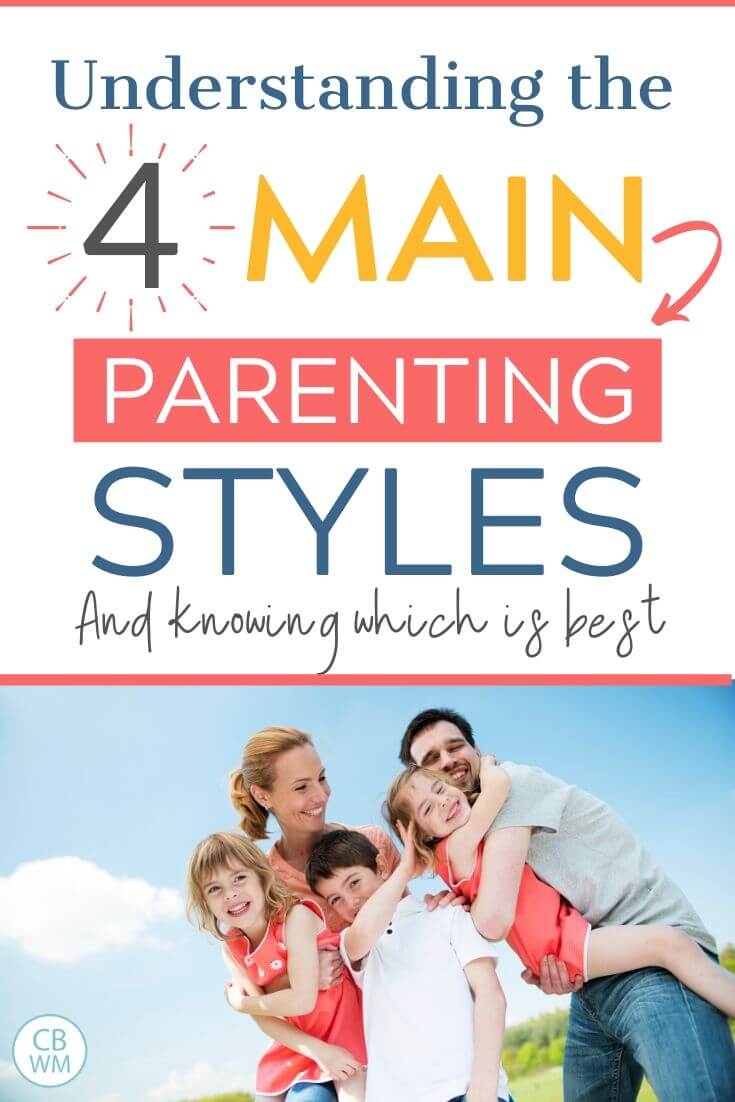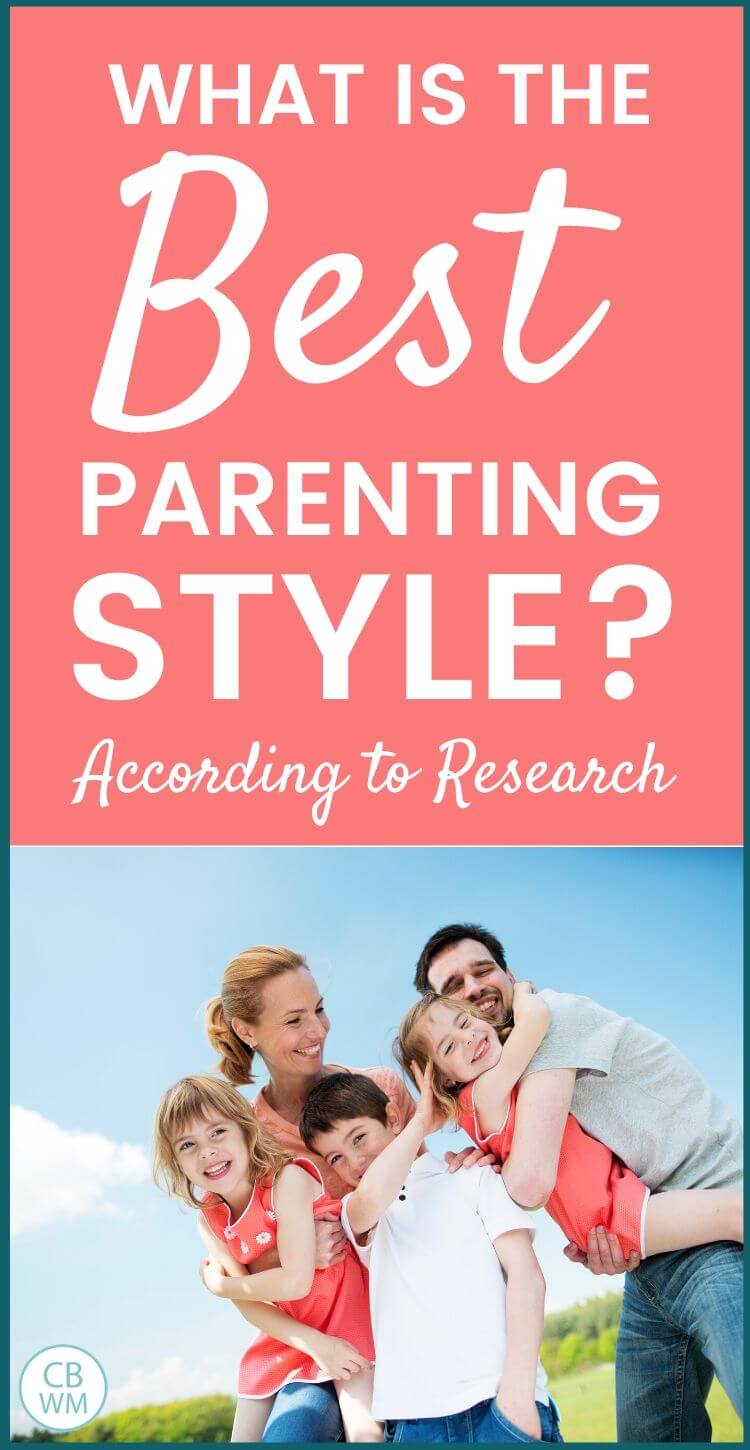Learn about the 4 types of parenting styles and which is the very best one. Know which style you fit and if that is the best way to be or not.

A parenting style is the way you tend to respond to raising your children. The strategies you use to discipline, train, guide, love, interact with, and direct your children all lead to forming your parenting style.
It is important to understand common parenting styles so you can aim to be in the parenting style that studies continually show is the best (yes, there is a best style).
The impacts of a parenting style, for better and worse, can be seen and measured as early as the preschool years. In other words, the effects of parenting styles on children’s behavior can be measured from a very young age.
One note before we dive in. I have often said there is no one right way to be a parent, and despite there being a “best” parenting style, I still hold true to that. The best parenting style, as you will see, allows parents to parent individual children, so there are many ways to fulfill the “best.” You can apply different parenting techniques within a parenting style. Continue reading to make sense of this.
Post Contents
- What are the main parenting styles?
- Authoritarian Parenting
- Permissive Parenting
- Uninvolved Parenting
- Authoritative Parenting
- What is the most effective parenting style?
- How to Identify Your Parenting Style
- Parenting Styles Can Change
- When Spouses Have Different Styles
- Helpful Parenting Books for being Authoritative
- Conclusion
- Related Posts
What are the main parenting styles?
There are typically three or four parenting styles discussed. We will talk about four.
- Authoritarian
- Permissive
- Uninvolved
- Authoritative

Authoritarian Parenting
Authoritarian is essentially when you expect your kids to obey with exactness and without question. One word to describe this parenting style is “strict.”
Authoritarian parents expect their children to do things simply because the parent said so. They often get very frustrated if a child asks “why” when told to do something.
An authoritarian parent often will look at discipline through the lens of “punishment”. This style is sometimes referred to as “disciplinarian.”
Authoritarian parents communicate at their children and not with their children. They do not like nor look for feedback. Expectations are very high.
The results of authoritarian parents can be:
- Raising good liars (kids get good at lying to avoid punishment)
- Poor social skills
- Adults who can’t make decisions because they were raised always just doing as they were told to do. They never question rules.
- Rebellious teens and even adults. Humans like to have a choice in life, and having that taken can result in a strong reaction to gain control back.
- Hostile and aggressive kids.
- Raising children who become adults with little to no self-esteem. They were never asked for their opinion nor trusted to have an opinion and they don’t trust themselves to have a good opinion.
Read: Why You Should Teach “Why”
Permissive Parenting
Just about the opposite spectrum of authoritative is permissive parenting. This is when you basically do not expect your child to follow rules and try to not interfere with your kids. One word to describe this parenting style is “indulgent.”
Permissive parents are very lenient and will often hand out empty threats. Permissive parents want to be well-liked by their children. They go for “friend” over “parent.”
These parents are willing to talk with their children, but rarely give any clear guidance and like to let the child decide for themselves. Expectations are very low.
The results of permissive parenting can be:
- Raising irresponsible children who grow to be irresponsible adults
- Behavioral problems since kids are not used to needing to follow rules
- Sad and insecure kids and adults with low self-esteem
- Raising kids who are impulsive, rebellious, and aggressive
- Higher likelihood for substance abuse
- Raising entitled kids who grow to be entitled adults
- Obesity and other health concerns because kids were never given limits and healthy lifestyles were never enforced
Read: Why You Should Be a Parent Before You are a Friend
Uninvolved Parenting
An uninvolved parent has little knowledge of what is going on in the child’s life. They don’t really put any expectations out there for the child. A good way to describe an uninvolved parent is “distant.”
It is as it sounds. The parent doesn’t ask the child about her day. The parent doesn’t have the child do anything around the house. There are few rules if any. They basically leave children to raise themselves.
Uninvolved parents typically are uninvolved for a serious reason. Mental health can interfere with parenting. Substance abuse or other addictions can make it hard to pay attention to the kids. Working too much or overextending yourself can leave you with little time to be involved. Some parents may think they are doing their child a favor by letting them figure out life on their own.
Communication between parent and child is very limited and there are no expectations put upon children.
The results of uninvolved parenting can be:
- Poor school performance
- Unhappy kids and adults
- Self esteem issues because the child doesn’t have the unconditional love coming that is basic to human nature
- Higher likelihood for substance abuse
- Kids who have to grow up too fast and take on responsibilities since there is not an adult helping them out. These kids can be amazing in school and very well behaved, but they are losing a childhood.
Authoritative Parenting
Authoritative parents are intentional in their parenting. They set rules and enforce them, but also explain the why behind them so kids can learn to apply them in context. You take into account extenuating circumstances when rules are broken.
These parents are actively trying to raise children who will be capable adults. They recognize that will require handing over decision-making freedoms. They recognize that will require the child to learn that there are consequences for actions. They recognize they need to allow children to be free-thinkers. They take charge as parents but are careful to not be too restrictive.
Read all about how to be an authoritative parent here
Authoritative parents are nurturing and set clear rules and expectations. They communicate regularly with their children. They get feedback from kids on setting goals and rules as appropriate.
The results of authoritative parenting can be:
- Happy kids who grow to be happy and successful adults
- Raising responsible, independent adults
- Raising friendly, happy adults who are curious
- Raising kids and adults who are comfortable expressing opinions
Read: 45 Questions To Get Your Child Talking
What is the most effective parenting style?
It is pretty clear as you read through the descriptions that the authoritative parenting style is the most effective parenting style (by the way, I HATE that authoritative and authoritarian are almost the same word!). Not only does it sound the best, but studies show it is the best.
Authoritative parenting focuses on being parents, not friends. It focuses on raising children who will one day be adults. You put effort into helping your kids develop the skills necessary to be an adult, including accepting consequences and responsibilities.
There is a measure of justice and a measure of grace applied. Discipline is used to correct and change behavior, not simply punish. And it is used. You are present and show your love and care, but you step back and let your child grow up.

How to Identify Your Parenting Style
Hopefully simply reading the descriptions so far has easily shown you what your parenting style is.
If you can’t tell, pay attention to how you respond when your kids disobey. Do you bristle and get angry? Do you respond demanding that obedience be perfect? Do you get upset if a child asks the “why” behind a rule or instruction? If yes, you are looking at Authoritarian .
Do you shrug off disobedience? Do you make excuses for your child? Do you think “Well, they are just kids!”? Do you worry about how much your kids like you? Do you give in to begging? If yes, then you are looking at permissive.
If you have basically no clue what is going on with your child, do not give instructions or rules, and rarely spend time with your child, you are uninvolved. If your child doesn’t disobey because there are no rules, you are uninvolved.
If you have rules and enforce them, but do have allowances for extenuating circumstances, you are authoritative.
>>>Read: How to Build a Strong Relationship with Your Kids
Parenting Styles Can Change
Your parenting style can change over time. It can even change from circumstance to circumstance.
It is not uncommon to change how you parent as your children get older and as you get older. How many times have we heard about the youngest of 6 who gets away with everything because the parents are just plain tired by then? Or you may have found yourself to be very patient with your toddlers when they misbehaved but have a very short tolerance for disobedience with your teens.
Your parenting style can even change from circumstance to circumstance. Perhaps you are very authoritarian when it comes to chores, but very permissive when it comes to how your child speaks to you.
When Spouses Have Different Styles
It is not uncommon for you and your spouse or partner to have different parenting styles. You were raised by different parents, and that will impact how you parent.
Some people grow up and want to parent very differently from their parents. It is very common to see children of authoritative parents turn permissive and children of permissive parents to turn authoritative. Both of those parenting styles have large gaps missing and people want to ensure their own children do not grow up with those gaps.
This is problematic because you are trying to parent your childhood and not your child. You need to learn from your past, but let it be your past and give your child what he/she uniquely needs.
Other people grow up and want to parent exactly like their parents did. They figure it was good enough for their parents, and they turnout out great, so why not simply continue on as they were raised?
This becomes tricky because there are two parents in the picture. You cannot adopt the way just one of you was raised. You need to have your way of raising your family.
Read: How To Unite as Parents
You can definitely take great ideas from your parents. Everyone will have great ways their parents did things and can apply to the way they parent. But you need communication so you and your spouse can be on the same page and you need to agree.
If you and your spouse tend to have different parenting styles, it is important to try to get on a similar plane. Talk things out and agree on how to respond and what is important to you.
But always remember, you cannot control anyone but yourself. Studies show having one authoritative parent is better than none, even if the other parent is something very different.
Read: Discipline 101: The Basics of Correcting Children
Helpful Parenting Books for being Authoritative
There are many books out there that help explain and guide parents toward being authoritative. Here are some of my personal favorites:
- Books by Kevin Leman. I find Kevin Leman to be really down to earth. He takes into account individual personalities of children (including their birth order). He applies grace to responding to children while having clear rules and boundaries set. Read: The Birth Order Book
- Parenting with Love and Logic. I love this book for getting in a frame of mind for allowing logical consequences to happen, but to do so without taking things personally. You learn to teach your child to live with the consequences of actions while responding with empathy and love.
- The Five Love Languages of Children. This book helps you learn to identify your child’s individual needs and to connect with your child on that level. A big part of being an authoritative parent is being warm and having open communication with your child.
- The On Becoming… Series. I first read about parenting styles in On Becoming Babywise. From the beginning of my parenting journey, I have been cognizant of how I am parenting and what impact that is having on my children.
Conclusion
Do not despair if you see yourself in any of the parenting styles that are undesirable. Work to become more authoritative. There will be times permissive is the best option in the moment and times authoritarian is the best option. As you are intentional about your parenting and apply context to situations, you will be parenting in the best way you can.
Related Posts
- Parenting With Love and Logic: Everything You Need to Know
- Remember to Teach Your Child Independence
- Have the Courage to be a Parent
- How To Raise Independent And Responsible Children
- 10 Parent/Child Date Ideas
- The Why and How of Knowing Our Children’s Love Languages
- Four Phases of Parenting
- Your Ultimate Goals of Parenting
